The solving of an ODE problem in version 13 on Windows 10
sol = DSolve[{x'[t] == Sqrt[1 - 2 x[t]^2]^2 + x[t]*Sqrt[1 - 2 x[t]^2],
x[0] == 0}, x, t]
{{x -> Function[{t}, ( 2 (Sqrt[3] Tanh[(Sqrt[3] t)/2] + Tanh[(Sqrt[3] t)/2]^2))/( 3 + 2 Sqrt[3] Tanh[(Sqrt[3] t)/2] + 3 Tanh[(Sqrt[3] t)/2]^2)]}, {x -> Function[{t}, (2 (Sqrt[3] Tanh[1/2 (Sqrt[3] t - 2 ArcTanh[Sqrt[3]])] + Tanh[1/2 (Sqrt[3] t - 2 ArcTanh[Sqrt[3]])]^2))/(3 + 2 Sqrt[3] Tanh[1/2 (Sqrt[3] t - 2 ArcTanh[Sqrt[3]])] + 3 Tanh[1/2 (Sqrt[3] t - 2 ArcTanh[Sqrt[3]])]^2)]}}
brings two solutions and this contradicts the existence and uniqueness of the solution of the Cauchy problem. The above is not a usual technical bug in Mathematica. A bunch of problems related to that ODE problem appears. First, the results of
Plot[(x'[t] - Sqrt[1 - 2 x[t]^2]^2 - x[t]*Sqrt[1 - 2 x[t]^2]) /.
sol[[1]], {t, 0, 5}, PlotRange -> All]
and
Plot[(x'[t] - Sqrt[1 - 2 x[t]^2]^2 - x[t]*Sqrt[1 - 2 x[t]^2]) /. sol[[2]], {t, 0, 5}]
demonstrate that sol[[1]] is not a solution of that ODE at all and sol[[2]] is its solution
only on the interval $[0,t_0]$ with $t_0\approx 1.04$.
Second, the command
FullSimplify[{x'[t] - Sqrt[1 - 2 x[t]^2]^2 - x[t]*Sqrt[1 - 2 x[t]^2],
x[0] == 0} /. sol[[2]], Assumptions -> t >= 0 && t <= 1]
is running without any response on my comp during more than two hours. Likely an infinite loop is accomplished here as well as in many, many other commands of Mathematica since the resourses of my comp are not exhausted (40 - 50 % of its processor and 200 - 350 MB of its ROM).
Third, when numerically solving the problem under consideration by
soln = NDSolve[{x'[t] == Sqrt[1 - 2 x[t]^2]^2 + x[t]*Sqrt[1 - 2 x[t]^2], x[0] == 0},
x, {t, 0, 5}, MaxSteps -> 10^6];
Plot[Evaluate[x[t] /. soln], {t, 0, 2}, PlotRange -> All]
, one obtains the solution only on the interval $[0,t_0]$ with $t_0\approx 1.04$.
For comparison, Maple 2022 results in
x(t) = RootOf(t + Int(-1/(1 - 2*_a^2 + _a*sqrt(-2*_a^2 + 1)), _a = 0 .. _Z))
for the symbolical solution and the same result as Mathematica for the numeric solution.
I think the above problems are caused by
x[1.04] /. sol[[2]]
0.707105 - 9.74433*10^-20 I
so DSolve and NDSove are not able to go over the branch point of Sqrt[1 - 2 x[t]^2] at $t_0\approx 1.04$.
The questions arise: is there a workaround? how to continue the solution for $t \ge t_o$?

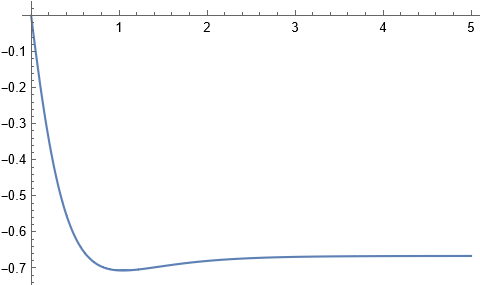
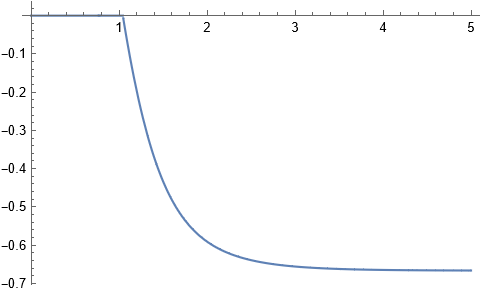
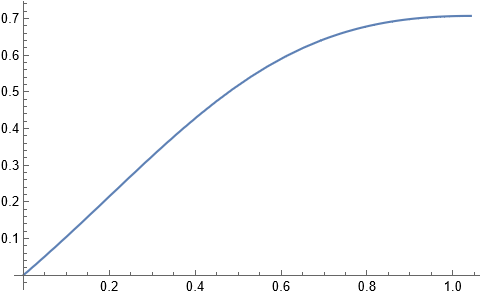
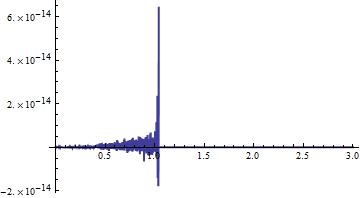
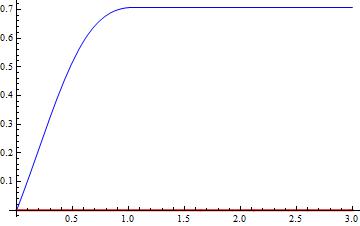
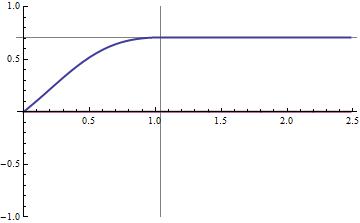
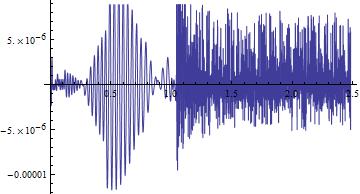
DSolve) and elementary considerations (all real solutions reach $x=1/\sqrt{2}$ in finite time). I think I'd call it a typicalDSolvetechnical problem and maybe not even a bug. Better to get a valid solution (sol[[2]]) than none at all, imo, since in this case it seems it is difficult, if not impossible, forDSolveto prove rigorousy each member ofsolis a solution. $\endgroup$